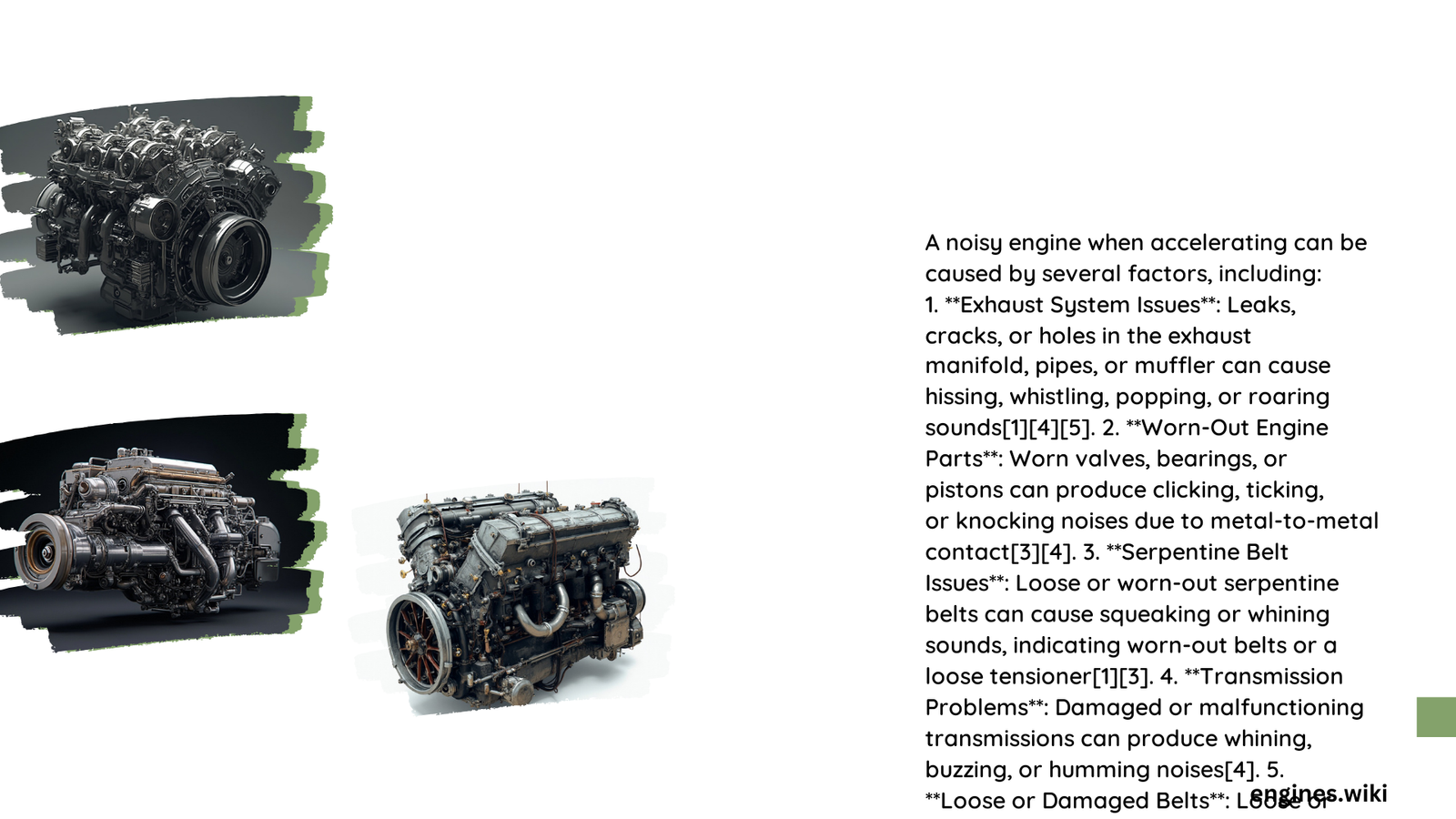A noisy engine when accelerating can be a sign of various mechanical issues ranging from minor to severe. Common causes include exhaust system problems, worn engine components, drivetrain issues, and belt problems. Proper diagnosis involves sound analysis, visual inspection, and specialized tools. Solutions vary in complexity and cost, from simple belt replacements to major engine repairs. Understanding these factors is crucial for maintaining vehicle performance and safety.
What Are the Common Causes of a Noisy Engine When Accelerating?
A noisy engine during acceleration can be attributed to several factors:
- Exhaust System Issues
- Exhaust leaks
-
Catalytic converter failure
-
Engine Component Problems
- Worn valves
- Failing bearings
- Worn pistons
-
Piston slap
-
Drivetrain Complications
- Transmission issues
-
Axle or driveshaft wear
-
Serpentine Belt Troubles
- Loose or damaged belts
- Pulley or tensioner problems
Let’s delve deeper into each of these causes:
Exhaust System Issues
Exhaust system problems are a common source of noise during acceleration. Here’s a breakdown:
| Issue | Symptoms | Potential Consequences |
|---|---|---|
| Exhaust Leaks | Hissing, whistling, or roaring sounds | Reduced fuel efficiency, potential health hazards |
| Catalytic Converter Failure | Louder engine sound, rattling noise | Decreased performance, failed emissions tests |
Exhaust leaks can occur due to corrosion, physical damage, or loose connections. A failing catalytic converter not only produces noise but also affects the vehicle’s emissions and performance.
Engine Component Problems
Engine components wear out over time, leading to various noises:
- Worn Valves: Produce a clicking noise, especially noticeable during acceleration as the valves move faster.
- Failing Bearings: Can create a ticking or screeching noise, more pronounced during acceleration.
- Worn Pistons: Often cause a knocking noise, sometimes at idle but often more noticeable during acceleration.
- Piston Slap: Occurs when the piston rocks back and forth in the cylinder, causing a metallic sound as it contacts the cylinder wall.
These issues not only create noise but can also lead to decreased engine performance and efficiency if left unaddressed.
How Can You Diagnose a Noisy Engine When Accelerating?

Diagnosing a noisy engine requires a systematic approach:
- Sound Frequency Analysis
- Listen carefully to the specific sound and its frequency
-
Different noises can indicate different problems (e.g., clicking for worn valves, knocking for worn pistons)
-
Vibration Testing
- Use vibration testing equipment to measure engine and component vibrations
-
Can help identify issues like worn bearings or loose engine mounts
-
RPM-Specific Measurements
- Monitor engine RPM and corresponding noise levels
-
Noises that increase with RPM might indicate valve, bearing, or piston issues
-
Visual Inspection
- Check exhaust system, serpentine belts, and other visible components
-
Look for signs of wear, damage, or looseness
-
Specialized Tools
- Stethoscope: To listen to specific areas of the engine
- Scan Tools: To check for error codes or performance metrics
- Vibration Analyzers: To measure and analyze engine vibrations
What Are the Effective Solutions for a Noisy Engine When Accelerating?
Solutions for a noisy engine vary depending on the underlying cause:
Exhaust System Repairs
- Exhaust Leaks
- Repair or replace damaged exhaust components
-
Cost: $100 to $1,000 depending on extent of damage
-
Catalytic Converter Replacement
- Replace failing catalytic converter
- Cost: $500 to $2,000
Engine Component Replacement
- Valves
- Replace worn valves
-
Cost: $500 to $2,000 depending on complexity and number of valves
-
Bearings
- Replace worn bearings
-
Cost: $300 to $1,500
-
Pistons
- Replace worn pistons (often requires full engine rebuild)
- Cost: $2,000 to $5,000 or more
Serpentine Belt Replacement
- Replace loose or damaged serpentine belt
- Cost: $50 to $200 depending on belt type and quality
How Can Regular Maintenance Prevent a Noisy Engine When Accelerating?
Preventive maintenance is key to avoiding engine noise issues:
- Regular Oil Changes
- Change engine oil every 5,000 to 7,500 miles
-
Use high-quality engine oil to reduce wear on components
-
Belt Replacements
-
Replace serpentine belts every 50,000 to 100,000 miles
-
Regular Inspections
-
Schedule regular check-ups to catch potential issues early
-
Prompt Repairs
- Address any unusual noises or performance issues promptly to prevent further damage
How Do Driving Conditions Affect Engine Noise During Acceleration?
Driving conditions can significantly impact engine noise:
- Load and Speed
- Normal acceleration noise: 70-80 decibels
- Problematic noise: Exceeding 90 decibels
-
Severe issues (e.g., worn pistons): Can reach 100 decibels or more
-
Temperature
- Cold Engine: More noise due to thicker oil viscosity
-
High Temperature: Can exacerbate noise and cause additional damage
-
Performance Metrics
- Increased noise often accompanied by:
- Reduced power output
- Lower fuel efficiency
- Increased vibration
Understanding these factors can help drivers identify potential issues early and seek appropriate maintenance or repairs.
